How and why King Gizzard & The Lizard Wizard released 5 albums in 2017
Stu Mackenzie has spent this year keeping up with his own ridiculous plan
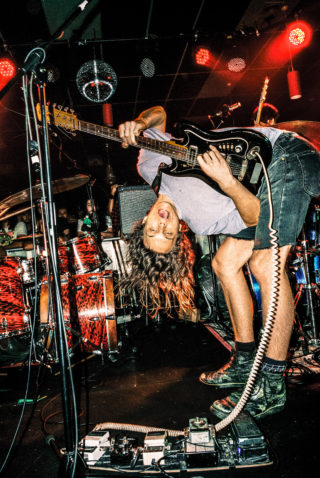
Stu Mackenzie has spent this year keeping up with his own ridiculous plan
“We’ve been busy, but I try to put that into perspective. I don’t feel as if I work as hard as a doctor does.”
To realise why Stu Mackenzie feels the need to contextualise his work ethic, you have to understand how closely to the grindstone he and his bandmates in King Gizzard & The Lizard Wizard have held their noses this year. Most bands do well to turn out a new full-length once every three years, but in November of 2016, Mackenzie announced plans for his group to release no fewer than five albums over the course of 2017.
They were hardly lazy before that news broke – in the six years since their formation, they’d already made eight LPs – but this particular endeavour seemed like ascension to another level entirely. Anybody who then glanced over the septet’s live schedule for the year would’ve been forgiven for wondering if they’d crossed the line from ambition to insanity. Mackenzie’s laid-back demeanour belies his prodigious output, and as much as that might seem like it sets him up for mischaracterisation (how many times have we heard the hard-touring Mac DeMarco described as the world’s premier purveyor of slacker rock?), it might just be the band’s serene approach to their work that’s allowed them to be so productive.
“I hope we’re actually going to make it to five records!” laughs Mackenzie over the phone from his native Australia – LP5 is still in the works, roughly scheduled for a Christmas Day release. “We’ve been busy all year, and that’s been cool. I try to write a little bit on tour, but not a lot tends to come off that. Once we’re at home, the studio’s just around the corner from my house, so I’ll go there every day and tinker away at whatever I’ve got going, and just make shit. Plus, you know, we don’t really have much of a filter, either; most bands will write fifty songs, and then whittle them down to twelve for an album. We just put all fifty out.”
There are few details on the fifth record at this point in time, but if it’s going to follow the trend set by the four that have preceded it this calendar year, it’s likely to have an identity all of its own. It’s little wonder that so many ascribe the ‘experimental’ tag to King Gizzard when their 2017 releases to date have all had such different feels to them; the first of them, ‘Flying Microtonal Banana’, was the woozy comedown to 2016’s fierce, complex ‘Nonagaon Infinity’, temperate in terms of both pace and structure. ‘Murder of the Universe’, meanwhile, was quite the opposite – a manic, intense rock and roll workout threaded together with sinister spoken-word exposition that extolled the apocalyptic themes of the record’s lyrics.
‘Sketches of Brunswick East’, released in August, was a collaborative effort with Alex Brettin, the Los Angeles singer-songwriter with a penchant for sunny guitars who records under the name Mild High Club, and perhaps the most compositionally abstract of the bunch in terms of the way the songs came together. Just last month, the fourth King Gizzard effort of 2017 was surprise-released, and the abrupt nature of its arrival wasn’t the only thing about ‘Polygondwanaland’ that raised eyebrows; it’s available as a free download that comes free of any copyright stipulations, which the group have altruistically waived. Already, there’s a Kickstarter campaign well on its way to full funding, run by a fan who intends to press the album to vinyl himself. (On Reddit’s last count, 32 small labels were planning limited runs; at Loud And Quiet we reeled off 50 cassettes in aid of the Refugee Crisis.)
There’s been so many twists and turns for King Gizzard this year that it’s a wonder Mackenzie can actually remember what the reasoning behind the five-album plan was in the first place. “I think there were a few things that led to us coming to that bizarre conclusion,” he says from the band’s tour van, which is headed from Canberra to the airport, to catch a flight to Perth. “Towards the end of 2015, we were finishing up ‘Nonagon Infinity’ and that was kind of a brutal record for us. We were coming straight off of some pretty heavy touring and jumping straight into that one, and because we made it in New York, it just felt like we were living and breathing it the whole time we were there. We were rehearsing the songs a lot, because we wanted to them to be so tight that we could go in and nail them in one take. The whole process was a bit of a head fuck, so by the time it was done, we were ready for a break.”
Around the same time, in early 2016, the band began hiring out a warehouse in their native Melbourne, which quickly became – for all intents and purposes – Gizzard Headquarters. They now had a considerably more relaxed environment to make records in than the one in which ‘Nonagon Infinity’ was cut, but the burnout that album had culminated in meant that nobody was in any mood to do so. When the ideas did start to finally formulate, Mackenzie recalls, they were disparate in nature.
“We toured heaps last year, but ‘Nonagon Infinity’ was the only thing we actually put out. So, instead, we were messing around with all kinds of different stuff; fast, heavy stuff that felt really linked to ‘Nonagon’, and then chilled-out, jazzy ideas that just seemed like they were from a totally different universe to that. Eventually, it felt like we had these four different ideas, to build four distinct albums around, and then somehow, that ended up becoming five. I think I got a little bit over-excited, but the challenge was something that felt really invigorating. It’s been really fun. We’ve maybe toured a little bit more than we’d anticipated, though, which is why this fifth record still isn’t done!”
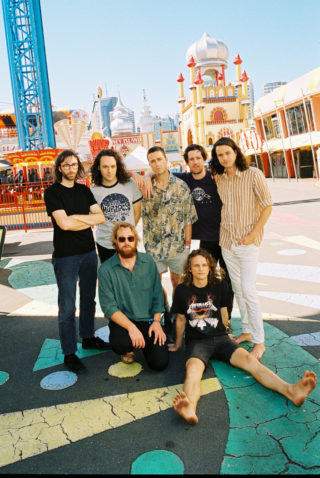
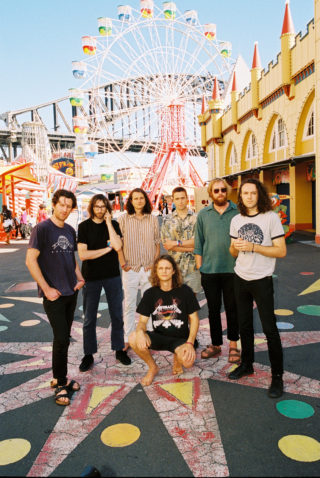
Chronologically, the first instalment in the Gizzard 2017 series came in March, with the fabulously-titled ‘Flying Microtonal Banana’; the album, a relatively sedate and breezy affair, was named after the guitar that formed its bedrock. “I went to Turkey a while back and I came back with this sort of folk instrument called a bağlama,” explains Mackenzie. “I was messing around and having fun with it for a while, which led to a few songs, and I thought we could maybe make our own Turkish folk album. We never actually recorded any of it, because once we started jamming, it became clear how difficult it is to translate the melodic parts from the bağlama to the other instruments. Instead, I had this guitar custom-made to resemble the bağlama in a simplified, more rigid form. That guitar was what we were calling the flying microtonal banana, and all the ideas for the record escaped from that instrument. We buried a couple of them pretty deep on ‘Nonagon Infinity’, but on ‘Banana’, all of that microtonal stuff really came to the fore.”
Instead, it was June’s ‘Murder of the Universe’ that had the closest ties to ‘Nonagaon Infinity’, both in terms of the way it sounds and with regards to the highly conceptual aspects of its vision. Where the lyrics on ‘Banana’ focused on a more tangible and real threat to the future of civilisation – environmental concerns and climate change – ‘Murder of the Universe’’s take on the End Of Days was more akin to the sort of things you’d see in horror fiction, from the ominous voiceovers to constant nods to monstrous transformation. “I think all the albums actually needed to be a little bit conceptual, in order that we could separate the songs into their appropriate categories,” Mackenzie relates. “That’s part of the reason why the four that are out are all so distinct from each other. With ‘Murder of the Universe’, though, the aim was basically to make a version of ‘Nonagon Infinity’ that was just more brutal, more disgusting – something like that. I wanted it to be scary and gross and, honestly, a little bit challenging.”
Anybody moved to suggest that ‘Murder of the Universe’ is the most indulgent of the 2017 releases to date might also have a point, by Mackenzie’s own admission. “Everyone always says that you should make music for yourself – that’s what you should be aiming for, so that you can kind of cast off the weight of expectation. But, to be honest, I think a lot of the time, you’re actually making music for your friends – or at least I am. I’ll write a song, and as I’m working on it, I’m thinking, ‘I’ll play this for such a person, because I think they’ll really dig it.’ ‘Murder of the Universe’ was an exception to that, because the whole time I was writing it, I was convinced that everybody was going to hate it except me! So I guess I made that one for myself, for a change.”
Given both the close ties of ‘Murder of the Universe’ to ‘Nonagon Infinity’ and the gruelling process that the band put themselves through to finish the latter, it’s possible that they were reacting against it and finding a little bit of catharsis in aiming to remake it in such an extreme new image. “There’s some truth in that,” Mackenzie agrees. “That’s something that would’ve happened subconsciously, for sure. ‘Nonagon Infinity’, at least for us, was a fairly calculated record, and although ‘Murder of the Universe’ was coming from the same place, and some of the most difficult songs and takes we’ve ever put down are on there, it still felt a lot more free, because when we were in the process of finishing it, we were letting the tracks go their own way, and if that meant they ended up in these far-out places, then great. That’s how the record took on so much of its concept and personality, and it was a much more enjoyable experience for us. We got to mess around a lot more, I guess.”
In turn, what followed ‘Murder of the Universe’ felt like a kick back against it. Had we not known in advance that every record that King Gizzard have put out this year has been by design rather than accident, it would’ve been easy to consider August’s ‘Sketches of Brunswick East’ a bit of a fluke. There was no bloody-mindedness about it, or roadmap of any kind; it simply fell together when Mackenzie cajoled his long-time tour mate Brettin into some collaborative sessions in Melbourne, once they finally got off the road for a little while.
“We toured with those guys quite a few times,” recounts Mackenzie. “I want to say that it was mostly through 2015. We played a lot with Mild High Club in Europe and in the States, and we just became good friends with them. Alex and I got on especially well, which is weird because I think we both have very different musical upbringings – it’s just that we arrive in this very similar place. I can’t read music or anything like that – I grew up just playing as loud as I could in pubs, you know? I just don’t know what I’m doing, most of the time. I’m always just kind of fucking around, but I’m curious, too, and I think Alex’s background is the sort of thing I’m fascinated by.”
Regardless of what the carefree tenor of his music might suggest, Brettin is a serious student of jazz, and it was that discipline and knowledge that drew Mackenzie towards the idea of a collaborative LP. “It’s like a horseshoe effect or something, the way we seem to meet in the middle. We just formed this friendship and I don’t really even know whose idea the record was. One day, we obviously decided between us that it was a good idea. At that point, as nice as it sounded, I’m not sure that we ever expected it to go anywhere, or end in something tangible. I think it was December last year that Mild High Club came down to Australia to play Gizzfest and I said to Alex, ‘why don’t you just stay here for another week, you can sleep at my place, and we’ll just go to the studio every day and try to make something.’ We had maybe ten or twelve weird ideas, that were usually just a chord progression with a melody over the top, and we just bounced them back and forth.”
As Mackenzie and Brettin began to hammer ‘Sketches of Brunswick East’ into shape, it became clear that they’d been able to tap into the same creative vein; the album’s title stems from the fact that, for much of the creative process, the individual ideas that became the songs on the record were just that – sketches of where the duo wanted to go. They’d turn on the tape machine as they played, and by the end of Brettin’s seven-day stay they had the basis of the record; work then continued in fits and starts, as the two traded recordings back and forth between Melbourne and Los Angeles.
That was something that continued for another six months before ‘Sketches of Brunswick East’ was actually ready, and as much as Mackenzie is now a staunch advocate for that kind of open-ended process, he does stress that an experimental environment doesn’t necessarily mean that the pressure is automatically off in creative terms.
“There’s always a little bit of pressure, and a little bit of pressure is always a good thing,” he says. “In some ways, if you’re going in blind, the stakes are a little bit higher. That was especially true of ‘Sketches of Brunswick East’, because Alex is this incredibly talented guy and I’m thinking, ‘I’ve got to make something that he’s going to like.’ At the very least, it had to be something that he’d be able to latch onto, and figure out where it could go next. I’d be trying to push him in a certain direction, but I’d also be holding back, because I didn’t think I was smart enough to know what chord inflection he was going for. I was happy to just hand it back and let him put his own sparkle on the songs. When he left Australia, I was stoked because I knew we had some good stuff, but at the same time I was kind of scared to listen back to what we had! I didn’t know what the fuck we’d just made! And there was a lot of chopping and changing, and editing – we almost sampled ourselves a few times.”
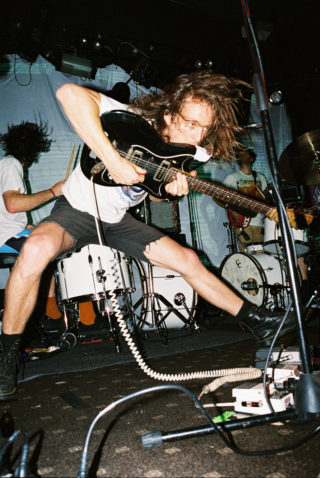
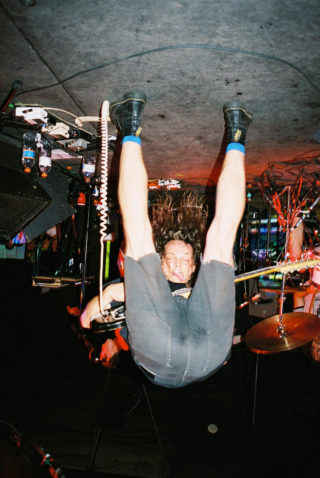
Typically, King Gizzard were already thinking about their fourth album of the year by the time that ‘Sketches of Brunswick East’ was out in late summer. ‘Polygondwanaland’ is, by some distance, the most compact and cohesive of the 2017 releases, scored through with a sense of urgency and purpose that we haven’t necessarily come to expect from the band. More than that, it’s also public property; it arrived in November as a free download (including liner notes, high resolution artwork and master mixes for your chosen format), with the prospect of a physical release being left in the lap of the gods – or, rather, the fans.
“I think we were maybe starting to feel guilty about trying to get people to buy so much stuff all the time,” Mackenzie laughs. “I know that, for my part, I was becoming really conscious of the band becoming this business entity, which I really don’t want it to be. It was overwhelming, that feeling of constantly selling yourself, and your music, and your merch, and I think what we wound up doing with ‘Polygondwanaland’ stemmed out of this thought of, ‘let’s try to change this, somehow.’ It just seemed to make sense to let people do whatever the fuck they wanted with it, you know? If we were going to give it away, then let’s do it properly. Let’s actually give it away. It wasn’t as overly thought out as it looks, I suppose.”
Effectively, the future of ‘Polygondwanaland’ remains open-ended; as Mackenzie points out, if somebody wanted to re-release it on wax thirty years down the line from now, there’d be nothing stopping them from doing so. Similarly, if anybody wanted to put it out on cassette, for a limited run with all proceeds to helprefugees.org, that’d be OK, too. “We had no idea what was going to happen, and honestly, we were as curious as anybody else as to where this whole idea would go,” he says. “Would people be interested at all? Would one of the big labels swoop in and try to put it onto vinyl? It’s going to exist in this weird state forever. It’s an ongoing experiment, and we’re as fascinated by it as anybody.”
As much as the record will always retain a sense of mystery, the primary source of intrigue for King Gizzard fans is LP5, which remains on schedule for a festive release at the time of writing. Mackenzie, though, is tight-lipped on it, only suggesting that it might sonically and thematically fall outside of the territory explored by the other 2017 records. “I think we’re gonna need every day we’ve got to get it finished! It’s cool, though. We’re figuring out how to execute it, I guess. It’s going to be it’s own thing. I think it’s maybe the most fun of the five records, or at least it has been to make it.”
Already, the seven-piece are turning their thoughts to 2018, which is – surprise, surprise – set to be a busy year. In February, they’ll play their biggest UK shows to date, with a gig at Brixton Academy. “It’s humbling and intimidating at the same time,” says Mackenzie. “Brixton’s going to be the biggest headline show we’ve ever done, I think. We’re just trying to keep going, to keep putting one foot in front of the other. We’re probably peaking right now – we’re probably maxed out – but it’s cool. I like going to the studio when I’m home – I feel like a real human – and I like driving around playing rock and roll and exploring beautiful places with my buddies when I’m on the road. I don’t have much to complain about.”